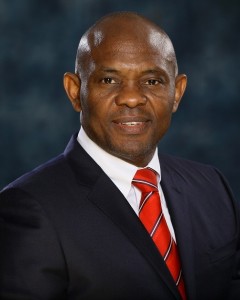“Only in Nigeria is our story even possible”, Tony O. Elumelu’s keynote speech at the Opening Dinner of the recently-concluded 17th Nigerian Economic Summit, bore echoes of Barack Obama’s keynote speech at the 2004 Democratic National Convention.
In one sense both were ‘campaign’ speeches on behalf of countries – one by a young, relatively unknown politician seeking to “affirm the greatness of [America]”; the other by an African business leader (Chairman, Heirs Holdings, and founder, The Tony Elumelu Foundation) seeking to trumpet the unique investment potentials of his native Nigeria, a country long viewed through the lens of dysfunction and stereotype.
Elumelu’s speech – consisting primarily of a number of “stories” – was targeted not only at the audience gathered in the Congress Hall of the Transcorp Hilton (drawn from the public and private sectors, and including business executives from outside Nigeria), but also at the global investing community, perpetually in search of new investment territories to explore and conquer.
The first of these stories was of MTN, the South African telecommunications company which in January 2001 paid $285mn for a Nigerian mobile license, in spite of the fact that Nigeria, barely two years out of a sixteen-year stretch of military juntas, was deemed a “risky bet” by foreign investors. In the first year the company amassed 300,000 subscribers. A decade later, against all the many odds, the company has 40 million subscribers in Nigeria (more than a quarter of the company’s total subscriber base), and the Nigerian business alone (out of the 21 countries in which the company operates in Africa and the Middle East) contributes close to a third of the group’s total revenues.
The next story featured Guinness Nigeria, a subsidiary of Diageo, one of the world’s leading manufacturers of alcoholic drinks. In part on the strength of the Nigerian business, Diageo designated Africa as an autonomous region starting from the 1st of July this year. Nigeria, Mr. Elumelu informed the audience, is currently the Diageo group’s second largest market worldwide for Guinness Stout, accounting for 41 percent of total sales. This is in spite of the severe infrastructural deficit that Nigeria continues to struggle – bad roads, inadequate power supply, and others.
Elumelu’s third story came from much closer home. The story of UBA, formed when he led, in 2005, a merger of Nigeria’s third and fifth largest banks, and which he ran for five years until his retirement in July 2010. At the time of the merger in 2005, UBA, Elumelu said, was “a one-country financial institution” (balance sheet size: $2.5bn) with less than 3 million retail customers, a 300-branch network and less than 40 Automated Teller Machines. Propelled by its deep Nigerian roots UBA has expanded into a total of 19 African countries, more than doubled its customer base, tripled its employee strength, and grown its balance sheet to $19.5bn.
The final story came from Nollywood. From an modest, almost accidental beginning in 1992, with the release of the movie ‘Living in Bondage’ by Kenneth Nnebue, Nigeria’s popular movie industry has grown, in less than two decades – and with little or no government support/funding, and against the backdrop of monumental piracy – to become the second largest movie industry in the world, after the Indian version, Bollywood. A World Bank Study revealed that Nollywood is Nigeria’s second largest employer of labour, after agriculture.
Underpinning these amazing stories, Elumelu concluded, are a number of factors. Arguably the most outstanding is “Nigeria’s extraordinary demographic profile” – it is currently the most populous country in Africa, and seventh most populous in the world, with analysts predicting that based on current growth rates Nigeria is on course to become the world’s 4th largest nation by 2050.
The fact that most of this population is young – half of Nigeria’s 160 million people are below 18 – is a bonus. As the developing world contends with ageing demographics, Nigeria presents a youthful population bustling with entrepreneurial energy, and the kind of appetite that supports unprecedented business growth across all sectors from banking to telecommunications to entertainment.
Also crucial, according to Elumelu, is the fact that Nigeria is – and has been over the last decade –one of the fastest growing economies in the world. And then there is Nigeria’s wealth of natural resources – many of which remain untapped.
He however also noted that these stories of possibility were not supposed to imply a wilful blindness to Nigeria’s several challenges: corruption, infrastructure failings, insecurity, weak institutions, bureaucratic bottlenecks, amongst others. He insisted that while not downplaying these challenges, Nigerians and the outside world ought to strive for a balance of storytelling; to avoid the danger of lapsing into one-sided narratives that fuel a despair that cannot be justified by the entrepreneurial energy of people and the inspiring balance sheets of successful investors.
Later that evening, when Mr. Joseph Makoju (special adviser to Alhaji Aliko Dangote, founder of Dangote Cement) spoke, it was to expand the dimensions of the possibilities drawn by Mr. Elumelu. From being the world’s second largest importer of cement, after the USA, only three years ago, Nigeria, Makoju said, is on course to becoming a net exporter of cement in the near future.
“Nigeria,” Elumelu concluded, “is a destination where multinationals can and do succeed; where domestic champions are rising and adopting increasingly regional and global strategies.”
It was a final challenge to the international investing community, keeping in line with the theme of the 17th Nigerian Economic Summit; ‘Attracting Foreign Direct Investment Through Global Partnerships.’

I like that nigerian businesses are making headway even in difficult situations. as power and other infrastructure remove, it won’t be difficult for have to have a sort of economic growth explosion.
Of all the great advancement businesses have made in Nigeria, the government and its people has greatly deteriorated too. Elumelu failed to mention that, typical of the oligarchic and nepotist ruling and affluent class of Nigeria